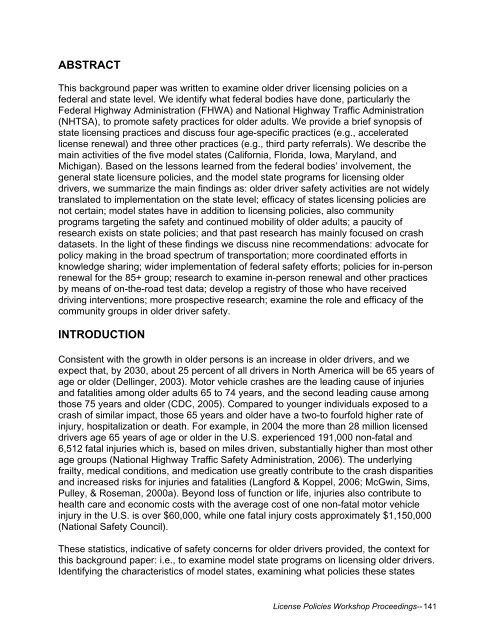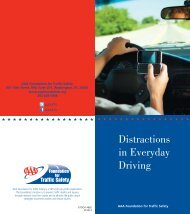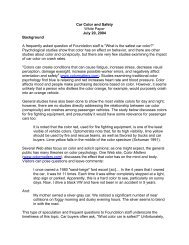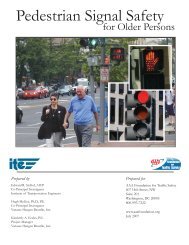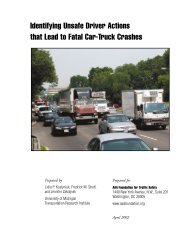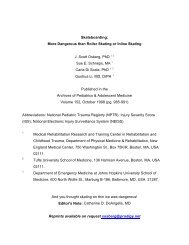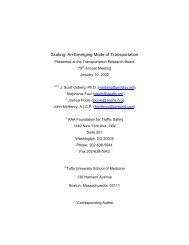Workshop Proceedings - AAA Foundation for Traffic Safety
Workshop Proceedings - AAA Foundation for Traffic Safety
Workshop Proceedings - AAA Foundation for Traffic Safety
Create successful ePaper yourself
Turn your PDF publications into a flip-book with our unique Google optimized e-Paper software.
ABSTRACT<br />
This background paper was written to examine older driver licensing policies on a<br />
federal and state level. We identify what federal bodies have done, particularly the<br />
Federal Highway Administration (FHWA) and National Highway <strong>Traffic</strong> Administration<br />
(NHTSA), to promote safety practices <strong>for</strong> older adults. We provide a brief synopsis of<br />
state licensing practices and discuss four age-specific practices (e.g., accelerated<br />
license renewal) and three other practices (e.g., third party referrals). We describe the<br />
main activities of the five model states (Cali<strong>for</strong>nia, Florida, Iowa, Maryland, and<br />
Michigan). Based on the lessons learned from the federal bodies’ involvement, the<br />
general state licensure policies, and the model state programs <strong>for</strong> licensing older<br />
drivers, we summarize the main findings as: older driver safety activities are not widely<br />
translated to implementation on the state level; efficacy of states licensing policies are<br />
not certain; model states have in addition to licensing policies, also community<br />
programs targeting the safety and continued mobility of older adults; a paucity of<br />
research exists on state policies; and that past research has mainly focused on crash<br />
datasets. In the light of these findings we discuss nine recommendations: advocate <strong>for</strong><br />
policy making in the broad spectrum of transportation; more coordinated ef<strong>for</strong>ts in<br />
knowledge sharing; wider implementation of federal safety ef<strong>for</strong>ts; policies <strong>for</strong> in-person<br />
renewal <strong>for</strong> the 85+ group; research to examine in-person renewal and other practices<br />
by means of on-the-road test data; develop a registry of those who have received<br />
driving interventions; more prospective research; examine the role and efficacy of the<br />
community groups in older driver safety.<br />
INTRODUCTION<br />
Consistent with the growth in older persons is an increase in older drivers, and we<br />
expect that, by 2030, about 25 percent of all drivers in North America will be 65 years of<br />
age or older (Dellinger, 2003). Motor vehicle crashes are the leading cause of injuries<br />
and fatalities among older adults 65 to 74 years, and the second leading cause among<br />
those 75 years and older (CDC, 2005). Compared to younger individuals exposed to a<br />
crash of similar impact, those 65 years and older have a two-to fourfold higher rate of<br />
injury, hospitalization or death. For example, in 2004 the more than 28 million licensed<br />
drivers age 65 years of age or older in the U.S. experienced 191,000 non-fatal and<br />
6,512 fatal injuries which is, based on miles driven, substantially higher than most other<br />
age groups (National Highway <strong>Traffic</strong> <strong>Safety</strong> Administration, 2006). The underlying<br />
frailty, medical conditions, and medication use greatly contribute to the crash disparities<br />
and increased risks <strong>for</strong> injuries and fatalities (Lang<strong>for</strong>d & Koppel, 2006; McGwin, Sims,<br />
Pulley, & Roseman, 2000a). Beyond loss of function or life, injuries also contribute to<br />
health care and economic costs with the average cost of one non-fatal motor vehicle<br />
injury in the U.S. is over $60,000, while one fatal injury costs approximately $1,150,000<br />
(National <strong>Safety</strong> Council).<br />
These statistics, indicative of safety concerns <strong>for</strong> older drivers provided, the context <strong>for</strong><br />
this background paper: i.e., to examine model state programs on licensing older drivers.<br />
Identifying the characteristics of model states, examining what policies these states<br />
License Policies <strong>Workshop</strong> <strong>Proceedings</strong>-- 141


